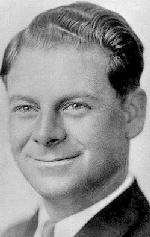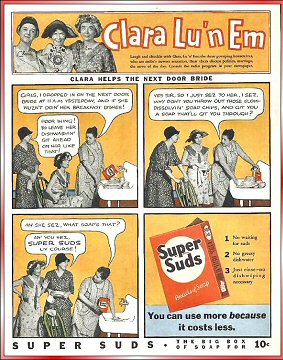Terry and the Pirates is a radio serial adapted from the comic strip of the same name created in 1934 by Milton Caniff. With storylines of action, high adventure and foreign intrigue, the popular radio series enthralled listeners from 1937 through 1948. With scripts by Albert Barker, George Lowther and others, the program's directors included Cyril Armbrister, Wylie Adams, and Marty Andrews.

Ma Perkins is an American radio soap opera that was heard on NBC from 1933 to 1949 and on CBS from 1942 to 1960. It was also broadcast in Canada, and Radio Luxembourg carried it in Europe.

Skippy is an American comic strip written and drawn by Percy Crosby that was published from 1923 to 1945. A highly popular, acclaimed and influential feature about rambunctious fifth-grader Skippy Skinner, his friends and his enemies, it was adapted into movies, a novel and a radio show. It was commemorated on a 1997 U.S. Postal Service stamp and was the basis for a wide range of merchandising—although perhaps the most well-known product bearing the Skippy name, Skippy peanut butter, used the name without Crosby's authorization, leading to a protracted trademark conflict.

Albert Pearce was an American comedian, singer and banjo player who was a popular personality on several radio networks from 1928 to 1947.

Backstage Wife is an American soap opera radio program that details the travails of Mary Noble, a girl from a small town in Iowa who came to New York seeking her future.

Anne Hummert was the leading creator of daytime radio serials or soap opera dramas during the 1930s and 1940s, responsible for more than three dozen series.
Amanda of Honeymoon Hill is a 15-minute daily radio soap opera produced by Frank and Anne Hummert. Broadway actress Joy Hathaway had the title role, sometimes described as "the beauty of flaming red hair." The series was broadcast from February 5, 1940, until April 26, 1946, initially on the Blue Network at 3:15 p.m. until August 1942. It then moved to CBS, airing at 10:30 a.m. until 1943 when it was heard at 11 a.m.
Percy Lee Crosby was an American author, illustrator and cartoonist best known for his comic strip Skippy. Adapted into movies, a novel and a radio show, Crosby's creation was commemorated on a 1997 U.S. Postal Service stamp. An inspiration for Charles Schulz's Peanuts, the strip is regarded by comics historian Maurice Horn as a "classic... which innovated a number of sophisticated and refined touches used later by Charles Schulz and Bill Watterson." Humorist Corey Ford, writing in Vanity Fair, praised the strip as "America's most important contribution to humor of the century".
Dick Tracy was an American detective radio drama series based on the popularity of the newspaper comic strip Dick Tracy by Chester Gould.
Pepper Young's Family is a daytime drama series, with various format and title changes during its long run from 1932 to 1959. It was created and written by short story author and playwright Elaine Sterne Carrington.

Clara, Lu, 'n Em is a radio soap opera, which first aired on June 16, 1930, over WGN-AM Chicago, Illinois. The show was picked up by the NBC Blue radio network and premiered at 10:30 p.m. Eastern Time on January 27, 1931. Thus, it became the first nationally broadcast radio soap opera. When Clara, Lu 'n Em was moved to a regular daytime time slot on February 15, 1932, it became the first networked daytime soap opera.
Judy and Jane was a radio soap opera originally heard on CBS from February 8 to June 17, 1932 and on NBC from October 10, 1932 to April 26, 1935. Sponsored by Folgers Coffee, it was heard regionally in the U.S. Midwest only.
Charles Robert Douglas Hardy Andrews was a novelist, screenwriter and radio drama scriptwriter.
Vernive Hill Blackett was a radio daytime-advertising pioneer who played a major part in the development of the soap opera.
Second Husband is a radio soap opera in the United States.
Kitty Foyle is an American old-time radio and television soap opera originally aired during the 1940s and 1950s that was based on the 1940 film of the same name starring Ginger Rogers. Kitty Foyle was created by soap opera mogul Irna Phillips of Guiding Light fame and produced by daytime radio monarchs Frank and Anne Hummert of Helen Trent recognition. The program originally starred Julie Stevens in the title role of Kitty Foyle on radio. On television, the title role was portrayed by Kathleen Murray.
Edward Frank Hummert, Jr., professionally known as Frank Hummert and sometimes credited as E. Frank Hummert, was an American advertising agent originally but was best known for writing/producing episodes of nearly 100 daytime/primetime radio dramas and soap opera serials between the 1930s and the 1950s.
Betty and Bob is a radio soap opera. The soap opera followed the lives of Betty and Bob Drake. Betty was a secretary who falls madly in love with her boss, bachelor Bob Drake. The two wed and each day, the subject matter dealt with everything from love to hate, jealousy to divorce, murder to betrayal, and collusion to insanity.
Little Orphan Annie is an American radio drama series based on the popularity of the comic strip Little Orphan Annie. It debuted on Chicago's WGN in 1930, then moved to the NBC radio network Blue Network on April 6, 1931. It aired until April 26, 1942.
The Carters of Elm Street is an American old-time radio soap opera. It was broadcast on NBC from February 13, 1939 to January 19, 1940 and on Mutual from January 22, 1940, to July 19, 1940.